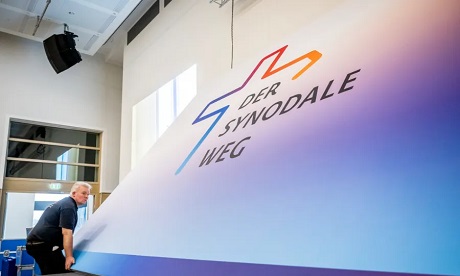The Catholic Church in Germany has dominated the headlines so far in 2023, thanks to its controversial “synodal way,” which concluded this month with endorsements of same-sex blessings, women deacons, and “gender diversity.”
Measured by international media attention alone, German Catholicism would appear to be a commanding presence on the world stage, pioneering radical changes to Church teachings and practices.
But could it be that, paradoxically, its influence within the wider Catholic Church is declining?
Consider the following developments:
- When Pope Francis announced the new line-up of his Council of Cardinals March 7, a notable name was missing: that of German Cardinal Reinhard Marx. The Archbishop of Munich and Freising had served on the “C9” since its creation in 2013.
- When the Vatican unveiled the preparatory commission for October’s synod on synodality in Rome March 15 none of the seven members was from Germany.
- Following the election of new leaders of the Commission of the Bishops’ Conferences of the European Union (COMECE) March 22, the German Church no longer has a representative on the body’s presidency. Previously, Bishop Franz-Josef Overbeck of Essen had served as one of four vice-presidents.
This could all be written off as a coincidence, but it might also be part of an emerging pattern in which Germans are perceived as either too controversial or lacking in team spirit to be selected for international Catholic bodies.
An economic force – but for how long?
The German Church’s wealth does, of course, ensure that it continues to wield significant global influence. Its generosity toward Latin America, Africa, and the Vatican no doubt create expectations of reciprocal support, or at least encourage tolerance of its contentious innovations.
The German Church received a staggering 6.73 billion euros from its church tax in 2021 — the second-highest figure on record — despite losing more members that year than ever before.
And yet, there is widespread recognition in Germany that the peculiar situation in which church tax income keeps rising despite a record number of Catholics leaving the Church will not last forever.
The Diocese of Aachen is reportedly preparing for a scenario in which church taxes are halved by the middle of the 21st century. Meanwhile, the Diocese of Eichstätt in Bavaria has just announced strict cost-cutting measures.
Eichstätt diocesan official Thomas Schäfers said March 16: “The financial consequences of the ongoing Church crisis are hitting our diocese with a force that we did not expect on this scale.”
With German dioceses embracing austerity, it’s possible that German Catholicism may struggle to provide the same level of funding to the worldwide Church in the coming decades. That would have a knock-on effect on its influence, though obviously that’s a much less significant consideration than the impact it would have on Catholics in the developing world.
A land without an ambassador
In the years following the Second Vatican Council, German figures have always played a notable role on the Catholic world stage. Major personalities have included theologians such as Joseph Ratzinger/Benedict XVI and Cardinal Walter Kasper, and well-connected churchmen such as Cardinal Karl Lehmann.
- Luke Coppen is The Pillar’s Senior Correspondent. He edited the U.K. Catholic Herald from 2004 to 2020 and was Europe editor of the Catholic News Agency from 2020 to 2022.
- First published in The Pillar. Republished with permission.
